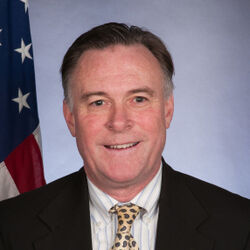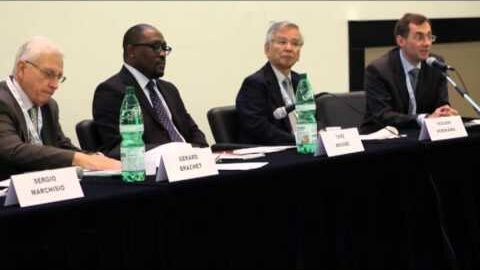Plenary 6: International initiatives for the safe and sustainable use of outer space
October 4th 2012, 9:00 – 10:00
The plenary entitled “International Initiatives for the Safe and Sustainable Use of Outer Space” was held during the 63rd International Astronautical Congress in Naples, Italy, on 4 October 2012. The event was organized by the International Institute of Space Law (IISL), through Kai-Uwe Schrogl, Vice President of IISL, Head of the ESA Policies Department in the European Space Agency, who also acted as the co-moderator together with Ken Hodgkins, Director of the Office of Space & Advanced Technology, the U.S. Department of State.
The plenary sought to inform the space community concerning the latest developments on space governance. It brought together distinguished space experts, including Gerard Brachet, President of the Academie de l’Air at de l’Espace; Tare Brisibe, Chairman of the UNCOPUOS Legal Subcommittee; Yasushi Horikawa, Chairman of the UNCOPUOS; Li Shouping, Director of the Institute of Space Law at the Beijing Institute of Technology; Sergio Marchisio, President of the European Centre for Space Law (ECSL); K.R.S. Murthi from India’s National Institute of Advanced Studies; and Jana Robinson, Resident Fellow at the European Space Policy Institute.
The event focused primarily on non-treaty multilateral space efforts, especially: the Working Group on the Long-Term Sustainability of Space Activities in the Scientific and Technical Subcommittee (STSC) of the UN Committee on the Peaceful Uses of Outer Space (UNCOPUOS); a proposal for an International Space Code of Conduct led by the European Union (EU); and transparency and confidence-building measures (TCBMs)-related efforts. This latter activity included the establishment (based on the UNGA Resolution 63/68) of the Group of Government Experts (GGE) on TCBMs in outer space activities, stemming from the UNGA First Committee.
Although acknowledging the positive momentum represented by existing work on the management of space activities, the speakers agreed that it is essential that concrete and complementary outcomes emerge in near future as the risks posed for safe and secure space operations are simply too high to do otherwise. It was emphasized that certain responsibilities accompany the “peaceful use of outer space”. Only closer adherence to the provisions of the international legal framework for space (especially the Outer Space Treaty) and to “best practices” for the sustainable use of space (including through the establishment of national space legislations), can adequately address urgent space security-related issues. Among these issues are continuously expanding space debris, the increasing number of space actors and spacecraft, and new, complex space technologies.
In the Scientific and Technical Subcommittee (STSC), a substantial progress was made by the Working Group on the Long-Term Sustainability of Space Activities (launched in 2010) to establish measures to advance safe and stable space operations. A report on “best practices guidelines” is expected in 2014.
The draft International Code of Conduct for Outer Space Activities, introduced by the EU, represents Europe’s most important contribution to date for global space diplomacy. The Code, introduced for the first time in 2008, represents a pragmatic and incremental process which can assist in achieving enhanced safety and security in outer space through, in part, transparency and confidence-building measures (TCBMs).
TCBMs have also been introduced in other frameworks. They are generally viewed as practical tools that can advance these goals and their implementation. Naturally, their effectiveness is heavily influenced by the level and genuineness of international support.
The UN First Committee, which considers disarmament and international security matters relating to outer space, hosts a 15-member Governmental Group of Experts (GGE) on Outer Space TCBMs, chaired by Russia. The Group met for the first time in July 2012 and two more meetings are scheduled to take place in April and July 2013. The GGE is seeking to produce a consensus report on TCBMs for the UN General Assembly in Autumn 2013.
In conclusion, there are various initiatives on global-level governance. They face, however, various obstacles, including the lack of defined compliance and enforcement measures. Moreover, as pointed out by the co-moderators, the international community now needs to solve the challenge of how to ensure that the goal underpinning these initiatives is clear and that the desired results do not work at cross purposes with one another. The ultimate objective is to persuade all space actors to configure their space activities in a manner that does not threaten the long-term sustainability of space.
Report by Jana Robinson
Panellists

Tare BRISIBE
Chairman, UNCOPUOS

Yasushi HORIKAWA
Chairman, UNCOPUOS

Shouping LI
Director of the Institute of Space Law, Beijing Institute of Technology (BIT)

K.R.S. MURTHI
, National Institute of Advanced Studies
Moderator

Kenneth HODGKINS
Director, Office of Space and Advanced Technology, US Department of State
United States







